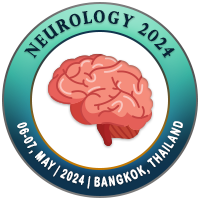
Ayushi Saxena
St. Martinus University, IndiaTitle: The Significance of Hallucinations and Delusions in Predicting Cognitive Dysfunction in Alzheimer’s Disease
Abstract
Alzheimer's disease, which is characterized by a gradual decrease in cognitive function and a range of neuropsychiatric symptoms, is a major worldwide health concern. Delusions and hallucinations are two of these symptoms that have drawn the most attention lately due to their possible importance in predicting cognitive failure in Alzeihmer’s disease. This abstract seeks to shed light on the significance of delusions and hallucinations as indicators of cognitive impairment in Alzheimer's disease. Despite being frequently linked to various psychiatric disorders, hallucinations and delusions have drawn more attention when it comes to Alzheimer's disease because of their possible importance in foretelling cognitive impairment. Additionally, there is a higher likelihood of the condition progressing from moderate cognitive impairment to Alzeihemer’s disease. Their function as early markers of cognitive deterioration in Alzeihmer’s disease is examined in this abstract. The diagnostic criteria for Alzheimer’s disease described in DSM-5-TR, require a decline in memory and learning and in at least one other cognitive domain among six cognitive domains (six cognitive domains affected in Alzheimer's disease, as per DSM-5, are complex attention, executive functioning, learning and memory, language, perceptual-motor function, and social cognition), and also interference with the activities of daily living because of decline in these cognitive functions; as such, DSM-5-TR positions memory impairment as the core symptom of Alzeihmer’s disease. It is estimated that at least 55 million individuals worldwide suffer from Alzheimer's dementia according to the United Nations. This number will nearly double every 20 years if innovations fail to be discovered, reaching 78 million in 2030 and 139 million in 2050. Delusions are set, erroneous assumptions that persist in the face of contradicting facts, whereas hallucinations entail the perception of sensory events devoid of outside input. Delusions usually entail irrational ideas, including grandiosity or paranoia, but hallucinations can present as vivid experiences in any sensory modality. Both are clinical symptoms that have been seen in Alzeihmer’s Disease. Impairment in cognitive functions that affect everyday activities, such as memory, attention, and logic, can be defined as cognitive dysfunction. It can have a variety of causes including neurological disorders, brain trauma, or other illnesses, and it can impair a person's capacity for learning, problem-solving, and social interaction. The connection between hallucinations, delusions, and cognitive impairment in Alzheimer's disease is caused by a variety of complex and poorly understood pathophysiological processes. Neurotransmitter system disruptions, specifically involving dopamine, serotonin, and acetylcholine, may impact different brain regions involved in perception, cognition, and emotion regulation. These disruptions may also play a role in the development of hallucinations and delusions as well as the advancement of cognitive decline in Alzeihmer’s disease. Furthermore, the pathology of Alzheimer's disease, which is typified by tau protein tangles and beta-amyloid plaques, can result in extensive neuronal loss and dysfunction, impacting the parts of the brain in charge of perception, higher cognitive abilities, and sensory processing. Delusions, hallucinations, and cognitive impairment in Alzeihmer’s disease may also be caused by changes in neural networks that link different parts of the brain and dysfunction in cortical-subcortical circuits. Neurological circuits and cognitive processes may be further disrupted by the psychological distress, depression, anxiety, and social isolation that are frequently seen in Alzeihmer’s disease patients. Overall, the complicated link between hallucinations, delusions, and cognitive impairment in Alzeihmer’s disease is likely caused by the interplay of neurobiological, neurochemical, and psychosocial components; thus, further study is needed to find new treatment options. Given their potential influence on prognosis, treatment, and caregiver support, the clinical evaluation of hallucinations and delusions in Alzheimer's disease requires a cautious and advanced approach. In order to improve patient care, healthcare providers need to be on the lookout for these symptoms and take prompt action to address them through thorough neuropsychiatric examinations and interdisciplinary therapies. Delusions and hallucinations are significant markers of cognitive impairment in Alzeihmer’s disease, emphasizing the need for more study to fully comprehend their complex link with cognitive deterioration. By using this information, better methods for the early identification, treatment, and management of Alzheimer’s disease may be developed, eventually leading to better patient outcomes.
Biography
Ayushi Saxena, MD, recently completed her clinical rotations as part of her MD program in Michigan, USA. With a profound interest in research, she has authored over 6 papers in the last year, notably including "Metabolic Syndrome Causing Cognitive Impairment in Patients with Schizophrenia: Systematic Review." As a young doctor, Ayushi is dedicated to advancing her field and is currently engaged in various editorial boards and publications. She is an active Level 2 counselor with Crisis Text Line USA, providing support to those in need. With aspirations to become a psychiatrist, Ayushi is passionate about mental health awareness and interdisciplinary research, particularly in connecting neuroscience with other domains. Beyond her medical endeavors, she actively participates in non-governmental organizations and serves as a healthcare activist, advocating for improved access to mental healthcare. Ayushi is committed to making a positive impact in mental health advocacy, research, and patient care.

